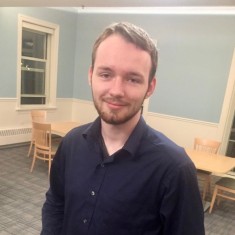George “Fenn” Napier ’20

Class Year
2020
Hometown
Burlingame, California
Diving Into Analytics
As early as his junior year at Lake Forest College, George “Fenn” Napier ’20—a double major in computer science and neuroscience—began using skills he learned in both disciplines to do analytical work in the emerging field of data science.
Working with his data science professor, Napier began applying machine learning and statistical algorithms on the human genome to predict colorectal cancer using data from a biochemistry professor’s research. With that experience underway, Napier earned a James Rocco Quantitative Data Research Scholarship.
Today, the senior feels so passionate about the field of data science and how it can enhance all majors that he launched a data science club on campus to share what he’s learned with other students.
How did you land your data science research opportunity?
I’m a really hands-on person, so I was looking for an opportunity to use the things I was learning in class. Near the end of my junior year, Assistant Professor of Mathematics Arthur Bousquet and I went around the entirety of the Lillard Science Center asking professor after professor: “Do you have data sets you’d like us to do projects on?” After talking to Assistant Professor of Chemistry William Conrad, who studies cancers, we started doing a collaborative project on survival rates for different types of cancers.
What was your role on the project?
Using what I learned about neuroscience and data science, I built machine learning algorithms to predict patients’ survival rates for different types of cancers. Then I reverse-engineered the machine learning algorithm to get its main predictors: What told it that this person was, most likely, going to die? We could then identify those factors as potential threats for other patients. We could say that, due to certain reasons, these patients should not undergo this treatment type.
Why study data science at Lake Forest College?
Data science, as a field, is relatively new. What Lake Forest College is doing with its data science program is giving students a very strong basis in computer science as a whole, then having them further specialize in one of three areas and teaching all the different techniques that apply to those specializations. That is, in my opinion, one of the better ways to go about it. The College is really good for data science, because it’s so interdisciplinary here. I was able to make an entirely new project between two entirely unrelated fields with two professors who hadn’t really talked before this. Now they’re rather good friends—I see them at lunch together in the Caf—and I’m good friends with them, too. I don’t feel that, at a larger university or at a non-liberal arts college, any of these things would have been possible for me.

